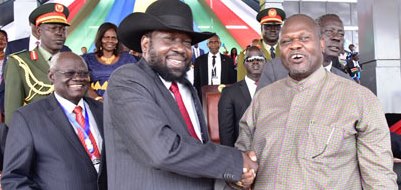Formation of South Sudan’s unity government could be delayed because the signatory parties to the peace agreement are yet to implement some major provisions of the deal, a political analyst said.
Speaking to Radio Tamazuj on Monday, James Okuk, a political science professor at the University of Juba, said the parties have not been able to determine the number of states and some major parts of the security arrangements are also yet to be resolved.
“If the parties have not managed to reunify the army during this time, this might affect the formation of the transitional government in May 2019. The second thing is the number of states. If they don’t agree on the number of states, they might face difficulties in forming the transitional government,” he explained.
In September last year, South Sudan’s arch-foes signed a revitalized peace agreement to end the country’s civil war that killed tens of thousands of people and forced millions to flee their homes.
The revitalized peace accord stipulates that there shall be a transitional government formed in South Sudan after eight months of the pre-transitional period.
According to the political analyst, the recent developments on the possible reunification of the various factions of South Sudan’s ruling party (SPLM) will have no major impact on the peace agreement.
He said the focus of all parties should instead be on how to fully implement the peace agreement, rather than focusing on political blocs, which are aiming at influencing general elections.
“I don’t think their reunification now is because of the formation of the transitional government; they are targeting the upcoming elections. This will not affect,” stressed Okuk.
The South Sudanese scholar urged all parties to the peace accord to focus on implementing the revitalized peace deal, rather than engaging in political blocs.
“There is need to speed up the implementation process,” he added.




